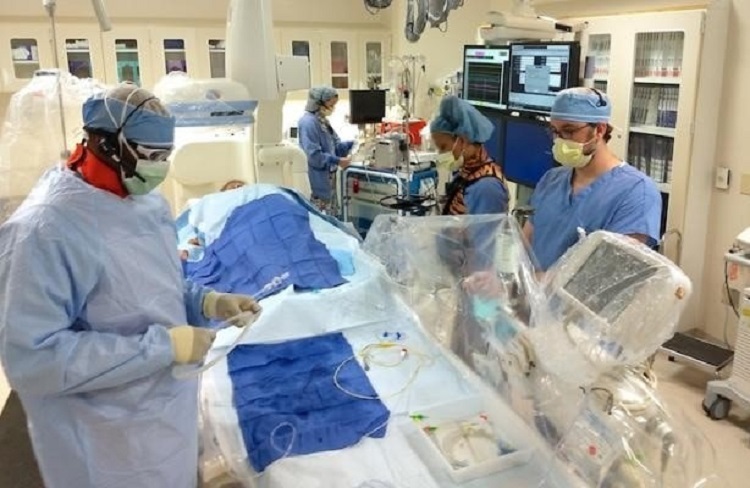Interventional cardiologists perform a wide variety of endoscopic procedures in the heart. Transcatheter aortic valve replacement is one example of an endoscopic procedure performed by an interventional cardiologist. Another procedure involves closing a hole in the heart, called a ventricular septal defect. Developing new techniques and technologies is part of the field’s ongoing evolution. A healthy diet is also important for someone with heart-related issues. Learn how to prevent heart-related diseases with these foods and beverages. Visit this website https://forumhealthcare.org/ to get more information about heart problems. For example, a recent study showed that the effectiveness of a new method for aortic valve replacement is better than those of previous treatments.
An interventional cardiologist’s skills are essential for treating a wide range of conditions related to cardiovascular disease. These physicians specialize in procedures to treat vascular disease, structural abnormalities, and heart valve disorders. In many cases, interventional cardiologists are not members of a patient’s medical team but are one-time care providers. However, the specialty is rapidly growing, so practicing as an interventional cardiologist can be an excellent career move.
The skills and techniques used by interventional cardiologists are highly advanced. A cardiac angioplasty, for example, will open a clogged artery. Then, a stent is used to clear up the blocked artery. A stent is a scaffold-like, medicated mesh tube that will help eliminate the plaque that remains. The stent will help strengthen the cleared artery and reduce the risk of future blockages.
Interventional cardiologists provide state-of-the-art care to patients who require interventional procedures. In addition, these specialists frequently perform imaging studies to accurately picture the heart’s structure and function. This information helps the doctors monitor heart health and diagnose any potential problems. The doctors perform these procedures to improve patients’ lives suffering from vascular disease. If you’re interested in learning more about these specialized physicians, contact an office near you today!
During their training, interventional cardiologists often focus on developing new techniques and devices for revascularization, which are vital for treating coronary artery blockages. In addition to coronary angioplasty, catheter-based interventions are also increasingly common. These procedures can restore the heart to a healthy state, restoring patients’ lives. In addition, a successful procedure can save a patient’s life and prevent future complications.
The field of interventional cardiology uses specialized catheter-based techniques to diagnose, treat, and repair a heart’s valves. These techniques may be used to diagnose coronary artery disease, structural heart disease, or a congenital heart defect. In addition, they are trained to treat various types of valves in the heart. In most cases, these specialists perform balloon angioplasty while performing less standard procedures such as repairing a faulty cardiac valve. Do not forget to visit this website https://www.healthytipshotline.com/ for useful information about maintaining your health.
In addition to these procedures, interventional cardiologists can also perform nonsurgical functions. These procedures are performed with a catheter. A transracial catheter is inserted into an artery. The procedure is nonsurgical, and patients can walk immediately following the procedure. The recovery time is much shorter, making it an attractive option for those with limited funds. However, the cost of the procedures varies, depending on which country they are performed in.
In addition to performing the procedures, an interventional cardiologist also performs nonsurgical procedures. These procedures use a small flexible tube to repair a blocked artery in some cases. They are handy for patients who cannot undergo invasive surgery. For example, a catheter is an essential tool in treating heart disease. During an angioplasty, a catheter will be inserted into the artery. Afterward, the catheter will be pulled into the artery.
Unlike traditional surgery, interventional cardiologists can treat a heart condition through a single tiny incision. The procedure is performed in less than an hour, and the patient doesn’t need to stay overnight afterward. The system also reduces the risks of a heart attack because the interventional cardiologist can open the artery. The process can also improve patients’ quality of life. While a heart doctor can’t cure a disease, a cardiologist can help them live a long and healthy life.
Interventional cardiologists are experts at diagnosing and treating heart problems, but their duties vary. They can perform conventional coronary angiography and stenting in the coronary arteries. These IRs can also do procedures on peripheral arteries and aortic aneurysms. In addition, they use ultrasound and percutaneous access to look at various body areas. As a result, a specialist can often diagnose heart problems without any difficulty.Learn more about health care on this website: https://www.health-disease.org/

